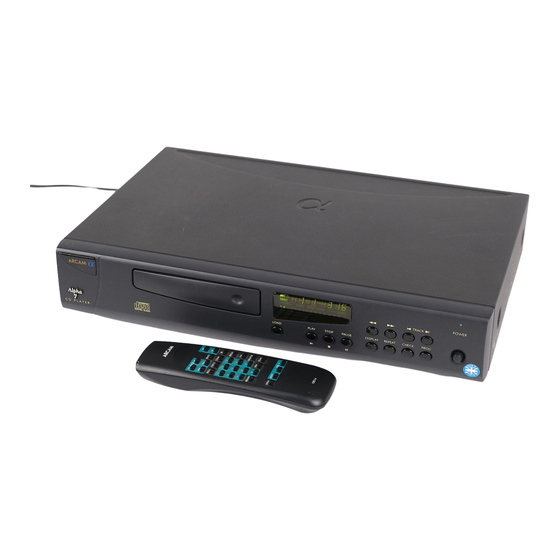- ページ 11
CDプレーヤー Arcam 8のPDF マニュアルをオンラインで閲覧またはダウンロードできます。Arcam 8 18 ページ。 Multi zone power amplifier
Arcam 8 にも: ハンドブック (8 ページ)

Front panel indicators
The front panel Zone Status LEDs indicate the status of each of the
amplifier zones:
• Red - standby
• Amber - zone muted
• Green - zone on
• Flashing Red - over temperature
RS232 remote control
The Arcam MZ amplifiers may be remote controlled using an RS232
data connection. The communication protocol is described from page 13
onwards. The following functions are available:
• Zone mute on/off
• Power/Standby
• Query zone status (mute, temperature)
12V Trigger Input
If a 12V trigger output is provided by any of the pre-amps connected to
the MZ amplifier, it can be connected to the 12V trigger in socket using a
3.5mm jack (shown below).
This enables the MZ amplifier to be powered on or off remotely from a
pre-amp.
Note that the main power switch on the front panel must be depressed
to allow the MZ amplifier to be switched in and out of standby using this
method.
Screen = Ground
Tip = +12V trigger signal
3.5mm jack - trigger connections
Troubleshooting
If you are having trouble with your amplifier, check the following items:
no sound
Check the following:
• Both the source component (pre-amp) and MZ amplifier are
switched on, indicated by the front panel LED being lit green on the
MZ amplifier.
• The MZ amplifier is not in standby, indicated by the front panel LED
being lit red.
• The source component (pre-amp) is not muted.
• The MZ amplifier is not muted, indicated by the front panel LED
being lit amber.
sound cuts-out unexpectedly
or suddenly becomes poor or distorted:
If the temperature of the internal heatsink rises above a safe level, then
a thermal cut-out inside the amplifier will operate. During this time
the front panel LED will flash red and the amplifier protection system
temporarily removes the power to the speakers. The system will reset
itself as the heatsink cools down.
• With low-impedance speakers connected (6Ω or less), overloads are
more likely.
• Overloading the amplifier may cause it to shut down because of
overheating.
11
